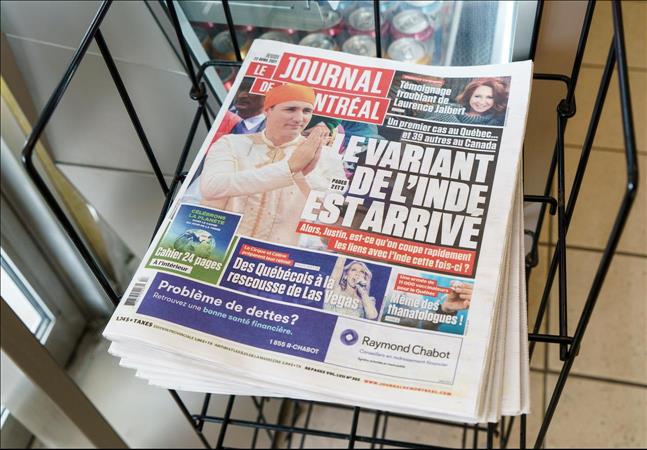(MENAFN- The Conversation) At the end of April, the Canadian government implemented a month-long travel ban to and from India and Pakistan due to COVID-19 crises both countries face and a new strain of the virus linked to India. The travel bans and new mutations have exacerbated the animosity South Asians have faced as a result of being singled out for COVID-19 outbreaks.
The Indian variant, , has been dubbed a ''double mutant,'' and data suggests that it is . However, little is still known about the variant including if vaccines will work against it.
The World Health Organization (WHO) , like the mutations from the U.K., South America and South Africa. Yet the western media sensationalized the variant
As the Indian variant becomes more prevalent within our borders, anti-South Asian sentiment is also growing, putting the community at a higher risk of hate crimes.
As a first generation South Asian Canadian and an anti-racism scholar at Carleton University, I''m interested in looking at the effects of the pandemic on the perception of minority communities. Due to the rise in hate crimes against the East Asian community, my concern is that South Asians will face the same violence but with less public support.
History of anti-South Asian racism
Over the past year, since the COVID-19 pandemic spread globally, there has been a , specifically targetting East Asian communities.
Tensions were exacerbated when former U.S. president Donald Trump referred to the In the past month, the movement has led to wide scale social supports and a coming together of the international community.
Read more:
In contrast, hate crimes against the South Asian community have been, and continue to be, largely under-reported. And when they are acknowledged, the stories quickly cycle out of the news.
Since South Asian people began migrating to Canada, . From the , an event that is largely unknown by Canadians despite it being the worst mass murder in the country's history, to the egregious acts of , South Asians have been left to shoulder pain and grief alone.
More recently, . There has been speculation that the . This shooting came a month after .
Unlike the Atlanta shooting, the Indianapolis shooting quickly disappeared from public view with very .
This lack of public support is parallel to the silence around hate . in Wisconsin, multiple incidents of and anti-South Asian sentiment have run rampant for the last 20 years. South Asians have had, and continue to, shoulder pain and grief of their own communities while trying to survive in a western world.

On April 22, Le Journal de Montréal used a file picture of Prime Minister Justin Trudeau dressed in traditional Indian clothing during his trip to India to illustrate a story on the Indian variant of the coronavirus. THE CANADIAN PRESS/Paul Chiasson Fueling fear and hate
As COVID-19 cases rose across Canada, regions with large South Asian populations became targets for politicians and the public.
The , and were reported as being COVID-19 hotspots because of large families and super spreader events. What the media and government officials failed to acknoweldge is that immigrant communities are largely frontline workers, who had little choice but to go into work during the pandemic.
Cultural and religious events such as and have been implicated in rising case numbers.
The media has consistently demonized immigrant populations for the high number of COVID-19 cases, without taking into account what these communities are facing. The housing market and forces them into situations - such as sharing homes and working in factories - .
The reporting of the travel ban and Indian variant borders on irresponsible due to the , as well as framing the country and those who originate there as
South Asians are as frustrated and scared as the rest of Canadians. However, biased reporting only works to further marginalize individuals who are already feeling vulnerable in a time of tense race relations.
Stop racially biased reporting
Recently, have been circulating warning Americans against interacting with South Asians. It is reminiscent of the anti-Chinese rhetoric that took place at the beginning of the pandemic.
The tone with which the U.K., South American and South African variants have been reported has not spurred any hostility towards those countries and its citizens, making it difficult to not see the implicit racism.
South Asians are asking for the media and government officials to root their warnings in scientific evidence, not stereotypes.
MENAFN16052021000199003603ID1102087607
Legal Disclaimer:
MENAFN provides the information “as is” without warranty of any kind. We do not accept any responsibility or liability for the accuracy, content, images, videos, licenses, completeness, legality, or reliability of the information contained in this article. If you have any complaints or copyright issues related to this article, kindly contact the provider above.